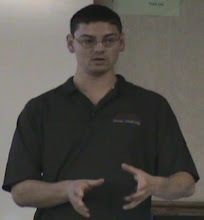Sunday, February 27, 2011
Solid state qubits
More progress on physical implementations of quantum computers: solid state qubits?
Wednesday, February 16, 2011
arXiv: Advances in Quantum Metrology

From arXiv: Advances in Quantum Metrology by Giovannetti, Lloyd, Maccone. It is a preliminary version, but still an intriguing topic. The abstract:
In classical estimation theory, the central limit theorem implies that the statistical error in a measurement outcome can be reduced by an amount proportional to n^(-1/2) by repeating the measures n times and then averaging. Using quantum effects, such as entanglement, it is often possible to do better, decreasing the error by an amount proportional to 1/n. Quantum metrology is the study of those quantum techniques that allow one to gain advantages over purely classical approaches. In this review, we analyze some of the most promising recent developments in this research field. Specifically, we deal with the developments of the theory and point out some of the new experiments. Then we look at one of the main new trends of the field, the analysis of how the theory must take into account the presence of noise and experimental imperfections.
(The image is figure 2 from the paper.)
Monday, February 7, 2011
arXiv: Experimental Extraction of Secure Correlations from a Noisy Private State

Recently revised on arXiv: Experimental Extraction of Secure Correlations from a Noisy Private State by Dobek, Karpinski, Demkowicz-Dobrzanski, Banaszek, and Horodecki:
We report experimental generation of a noisy entangled four-photon state that exhibits a separation between the secure key contents and distillable entanglement, a hallmark feature of the recently established quantum theory of private states. The privacy analysis, based on the full tomographic reconstruction of the prepared state, is utilized in a proof-of-principle key generation. The inferiority of distillation-based strategies to extract the key is exposed by an implementation of an entanglement distillation protocol for the produced state.
There is a short summarizing article here too:
The latest experiment with photonic entanglement, conducted by Polish physicists working in the consortium National Laboratory for Quantum Technologies, may be of vital importance to make quantum cryptography a more widespread technology. It has been demonstrated that secret communication based on quantum phenomena, which guarantees unconditional security against eavesdropping, can be also realized using sources of quantum entanglement considered until now to be too corrupt.(Image taken from the paper.)
Tucci's take on programming
Robert Tucci has a blog on quantum computing that he's written some good things in. I strongly agree with what he wrote today and believe all of us in the field of quantum computer programming should be following:
I try to write QC programs in a platform-independent way; i.e, a way that is independent of which particular qubit realization eventually wins the grand race for a scalable QC. Whether that be anyons or any of the many other realizations currently being tried.
Subscribe to:
Comments (Atom)
